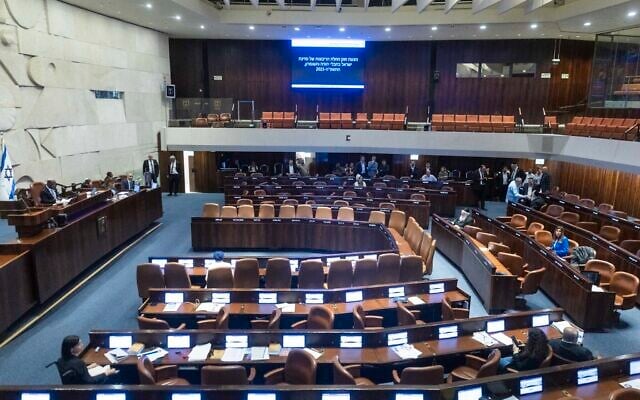US Secretary of State Marco Rubio said Wednesday night that the Knesset’s move toward annexing the West Bank could threaten President Donald Trump’s plan to end the Israel-Hamas conflict in Gaza.
“They passed a vote in the Knesset, but the president has made clear that’s not something we’d be supportive of right now,” Rubio told reporters before taking off for Israel. “We think there’s potential for [it to be even] threatening to the peace deal.”
The Knesset on Wednesday passed, in a preliminary reading, a bill that would apply Israeli sovereignty to all West Bank settlements — as well as another, more limited bill to annex a major city-settlement — despite opposition from Prime Minister Benjamin Netanyahu and most of his Likud party. The legislation then went to committee for deliberations and revisions, and would have to pass three more votes in the Knesset to become law.
Last month, Trump broke his silence on potential Israeli annexation of the West Bank amid mounting Arab opposition, vowing that he wouldn’t allow such a move to take place.
“They’re a democracy, people are going to have their votes, people are going to take these positions, but at this time we think… it might be counterproductive,” Rubio added.
The top US diplomat will land in Israel Thursday “to support the successful implementation of President Trump’s Comprehensive Plan to End the Conflict in Gaza, which has garnered unprecedented international support,” according to the State Department.
“During his visit, the secretary will reaffirm America’s unwavering commitment to Israel’s security and engage with partners to build on the historic momentum towards durable peace and integration in the Middle East,” it added. Rubio is set to join US Vice President JD Vance, who arrived in Israel earlier this week, as top US officials continue to press both Jerusalem and Hamas to stick to the ceasefire agreement reached the week before and advance to its next stages.

All but one Likud lawmaker boycotted the Knesset votes on annexation: MK Yuli Edelstein, who broke ranks to vote in favor, casting a decisive vote and helping the bill on annexation of all settlements scrape by, 25-24.
In a statement, Netanyahu’s Likud party dismissed the bills as opposition “trolling… aimed at damaging our relations with the US and Israel’s great achievements in the campaign” in Gaza.
“We strengthen settlement every day with actions, budgets, construction, industry, and not with words,” the party said.
Many in Netanyahu’s coalition have been loudly calling to advance annexation as a response to the recognition of a Palestinian state by Western powers last month. In early September, Finance Minister Bezalel Smotrich publicly called for the annexation of 82 percent of the West Bank, even as regional countries warned that such a move would spell the end of Israel’s integration into the Middle East.

Other senior members of the cabinet, including Justice Minister Yariv Levin and Defense Minister Israel Katz, have also endorsed annexation. This summer, the Knesset overwhelmingly approved a non-binding motion in favor of applying Israeli sovereignty in the West Bank.
However, Trump has ruled out such a move, stating last month that he will not allow Israel to annex the West Bank, and prompting Netanyahu’s coalition allies to insist that the premier ignore Washington.
“I’m not allowing Israel to annex the West Bank,” Trump repeated. “There’s been enough. It’s time to stop now.”
The Prime Minister’s Office is concerned that efforts to annex the West Bank could spark a diplomatic crisis with Washington, the Kan public broadcaster reported last week.
Without US support, Israel is much less likely to go ahead with the move, which would have diminished significance without backing from the world’s leading superpower and spark massive international backlash.

A top Emirati official warned in an exclusive interview with The Times of Israel last month that annexation would be a “red line” that would mark the “end” of regional integration.
And Saudi Arabia on Wednesday denounced the Knesset’s moves toward annexation, saying they were aimed at “legitimizing Israeli sovereignty over illegal colonial settlement.”
“The kingdom stresses its complete rejection of all settlements and expansionist violations perpetrated by the Israeli occupation authorities,” the Saudi foreign ministry said in a statement. “The kingdom reiterates its support for the inherent and historical right of the Palestinian people to establish their independent state on the 1967 borders with East Jerusalem as its capital, in accordance with relevant international resolutions.”
The statement also called to “put an end to all blatant Israeli attacks on the Palestinian territories and and the Palestinian people, and advance the peace process based on the implementation of the two-state solution, thus achieving security and stability in the region.”

